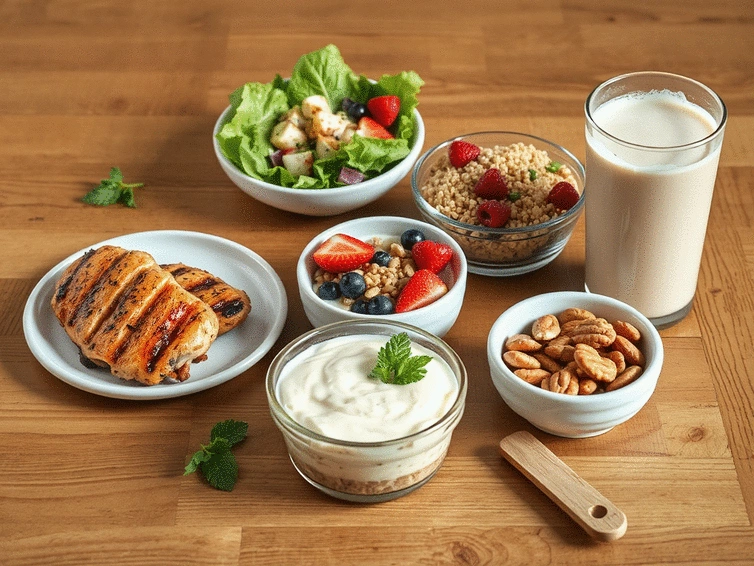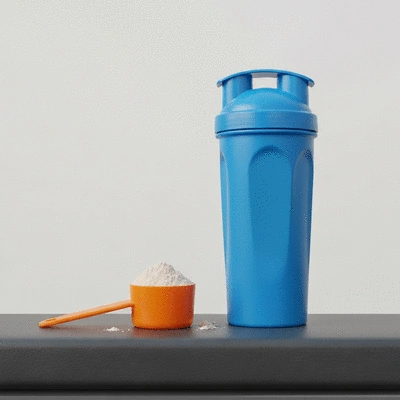Why Protein is Essential
- Supports Muscle Repair
- Boosts Muscle Synthesis
- Enhances Recovery Times

What if you could elevate your fitness journey simply by rethinking your protein intake? Understanding the power of high-protein nutrition can transform your muscle recovery and growth significantly.
The following visual outlines the essential aspects of protein for muscle growth, recovery, and effective intake strategies, based on expert recommendations.
As a fitness enthusiast, I can’t stress enough the importance of protein in our diets, especially when it comes to muscle growth and recovery. Protein is the building block for our muscles, and without adequate amounts, our bodies can struggle to repair and grow stronger after workouts. In this section, we'll explore why protein is essential, how timing can affect its effectiveness, and share some delicious ways to incorporate high-protein options into your daily routine!

When we push ourselves in the gym, our muscles sustain tiny tears. This is perfectly normal and, in fact, essential for growth! Protein plays a crucial role in repairing these tears and building new muscle. By including enough protein in your diet, you’re giving your body the necessary resources to recover effectively and grow stronger. For a deeper dive into the science of muscle growth and protein, you can read this study on protein intake and muscle mass.
Incorporating high-protein foods into your meals and snacks is a simple yet effective way to ensure your body has what it needs to thrive. So, let’s get to it and make those protein-packed choices!
Did you know that when you consume protein can be just as important as how much you consume? Timing your protein intake can enhance muscle protein synthesis, leading to better recovery and growth. Ideally, you want to focus on post-workout nutrition to maximize the benefits. Research consistently highlights the importance of protein distribution throughout the day, as detailed in this article on protein intake timing.
By being mindful of when you eat your protein, you can maximize your results and support your fitness journey effectively. Remember, it’s not just about what you eat; it’s also about when you eat it!
We'd love to know your thoughts! How do you prefer to incorporate protein into your diet?
As we wrap up our discussion on high-protein nutrition, it's clear that incorporating protein-rich snacks and meals into your routine can significantly enhance your muscle growth and recovery. Protein is not just a building block for muscles; it plays a crucial role in repairing tissues and supporting overall health. Understanding these benefits can help you make informed choices that align with your fitness goals.
Here are some key benefits of high-protein nutrition:
By recognizing these benefits, you're better equipped to optimize your protein intake, making choices that support your journey toward a healthier, stronger life!
Let's pause and reflect on the main takeaways regarding high-protein nutrition. To ensure you're maximizing the benefits:
These practices can empower you to take control of your nutrition and make choices that align with your fitness aspirations. Remember, at iFit Magazine, we believe in the power of informed decision-making to enhance your wellness journey.
Now that we've explored the importance of high-protein nutrition, I encourage you to start incorporating these snacks and meals into your daily routine! Imagine reaching for a delicious protein-packed snack after a workout or whipping up a satisfying meal with a good protein source. These choices not only taste great but also fuel your body in the best way possible.
Consider this: what if you could transform your energy levels and recovery simply by planning your snacks? It’s an exciting prospect, isn’t it? So, let’s take action! Experiment with different high-protein options each week, keeping it fun and varied. And remember, every small step you take is a leap toward your fitness goals!

Tracking your protein intake can feel overwhelming, but fear not! There are plenty of resources available to simplify this process. I recommend considering the following tools:
Using these tools can bring clarity to your nutrition goals and help you stay accountable!
While focusing on protein is crucial, let’s not forget the importance of hydration and micronutrients. Staying hydrated supports muscle function and aids recovery. Aim to drink plenty of water throughout the day, especially before and after workouts. For further information on how hydration and micronutrients impact athletes, consult this review on nutritional strategies for athletes.
Additionally, consider incorporating foods rich in vitamins and minerals that enhance recovery, such as:
By balancing your protein intake with adequate hydration and micronutrients, you'll create an optimal environment for muscle recovery and growth.
Finally, if you're looking for convenient ways to supplement your protein intake, consider exploring protein supplements. Options like whey protein, protein bars, and protein shakes can be effective additions to your diet.
Here’s a quick breakdown of the benefits of each:
Incorporating these supplements can help you reach your daily protein goals, especially on busy days when meal prep isn't feasible.
A: Protein is the building block for muscles. After workouts, muscles sustain tiny tears, and protein helps repair these tears and build new, stronger muscle tissue through a process called muscle protein synthesis.
A: While even distribution throughout the day is beneficial, consuming protein within 30 minutes post-workout is often recommended to maximize muscle protein synthesis and aid in optimal recovery. A pre-workout protein snack can also enhance performance.
A: Besides supporting muscle recovery and growth, high-protein nutrition increases satiety, helping with weight management by reducing cravings. It can also slightly boost metabolism due to the energy required for protein digestion.
A: To optimize protein intake, include a variety of protein sources (animal and plant-based), spread your intake evenly across all meals and snacks, plan your meals in advance, and listen to your body's specific needs.
A: Protein supplements like whey protein, bars, and shakes can be convenient and effective tools to help you reach your daily protein goals, especially on busy days. However, they are not strictly necessary if you can meet your protein needs through whole foods.
Here is a quick recap of the important points discussed in the article:
Choosing the Right Fitness App

Choosing a fitness app can feel like a daunting task, especially with the plethora of options availa
Flavorful Low-Salt, Low-Sugar Recipes

What if reducing salt and sugar could not only enhance your health but also transform your culinary
Functional Fitness for Better Balance

Are you ready to transform your workout routine into something that truly benefits your everyday lif
Choosing the Right Fitness App
Flavorful Low-Salt, Low-Sugar Recipes
Functional Fitness for Better Balance
Family Fitness: Inspiring Success Stories
From Loss to Hope: Resilience